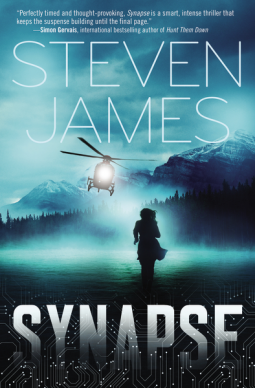
Synapse by Steven James
Genre: Christian mystery/thriller/science fiction
Publisher: Thomas Nelson
Publication date: October 8, 2019
Summary
Thirty years in the future, when AI is so advanced that humans live side by side with cognizant robots called Artificials, Kestrel Hathaway must come to terms not just with what machines know, but with what they believe.
Soon after experiencing a personal tragedy, Kestrel witnesses a terrorist attack and is drawn into a world of conspiracies and lies that she and Jordan, her Artificial, have to untangle. With a second, more brutal attack looming on the horizon, their best chance of stopping it is teaming up with federal counterterrorism agent Nick Vernon.
But the clock is ticking—and all the while, Jordan is asking questions Artificials were never meant to ask. (from Goodreads’ blurb of Synapse)
My thoughts
When I received the email from NetGalley approving my request to read Synapse, I did a little happy dance in the order line at Subway. (My daughters were mortified.) I have read several of James’ thrillers and was excited to have been approved for this one.
Tragedy & a crisis of faith
To me, Synapse is a bit different from his Patrick Bowers novels. While Bowers does think and talk about his Christian faith, he’s a FBI agent on the bloody trail of various devious killers: he doesn’t have much leisure time for debates about God’s existence or goodness.
Kestrel, on the other hand, is a minister. Dealing with questions about God and spiritual matters comes with the job description. However, in this case, Kestrel struggles with her own questions, not just other people’s.
The novel opens in second person point of view (“you”) as Kestrel delivers a stillborn baby girl. It is a compelling, emotional scene that broke my heart. I teared up. Soon we learn that she’s a single woman, a minister, who decided to have a child on her own (presumably by artificial means). Now she faces a crisis of faith: her own faith.
Can she continue to love God? Where was he when her daughter died? Why has he stopped talking to her? And the central question that haunts the novel and minds of many people, fictional or not: Was any of it real?
Artificials
What’s real and what’s artificial are central concerns in this story.
In this futuristic society, Artificials have inalienable rights. They can exist. They have the right to die. Also, they can have hope, too. The CoRA, tech company Terabyne’s mainframe computer system’s secure location, stores the essence of each Artificial after it suffers a “terminal event.” (Translation: it dies.)
This last part worries Jordan, Kestrel’s Artificial; his “mother” has died, and like many humans wanting assurance about their loved ones’ afterlife, he wants assurance that she is safely in the CoRA. His concerns run parallel to Kestrel’s and she grapples with what assurance she can give him.
Jordan, an extraordinary Artificial
For me, Jordan is the highlight of the novel. When James takes us into his point of view, it’s fascinating to see how Jordan describes things. It’s like he is awakening to what it’s like to be human: all those maddening, paradoxical aspects of our being that give us depth, if only we have the courage to examine them. Not everyone has that courage. But Jordan, an advanced Artificial, has both the courage and curiosity to explore them.
The story’s conflict
I appreciate how James has Kestrel and others wrestle with some contradictory ideas that are difficult, if not impossible, to resolve. This is unusual in a thriller. The characters openly discuss many spiritual and philosophical and moral issues. I like characters who wrestle with difficult concepts.
Unfortunately, that sometimes slows down the pace of the story. I’m not sure that all of the discussions were necessary, nor am I certain that they serve the story as well as they could.
The story feels like a paradox itself: is it a fast-paced thriller or is it a slower-paced science fiction novel that explores spiritual matters? In trying to be both, the story suffers. There are a lot of different point of view characters, which helps the suspense. However, this makes it less likely for us to care as much about Kestrel’s crisis of faith, which is central to the emotional core of the story.
The outer conflict
Even so, I was on edge in anticipation of how things would work out between the terrorist Purists and tech company Terabyne. As always, James knows how to plot a thriller. Agendas collide, battle lines are drawn, tensions build–and build–and build until they explode in a catastrophic climax that leaves some dead and everyone else bruised, battered, and possibly wiser for the experience. (I hope!)
James did a great job blurring the lines between good and bad. The Purists have legitimate concerns. The tech gurus aren’t all on the up-and-up. Artificials and humans alike are devious (or not), helpful (or not), and morally complex. It’s hard to know who or what to root for.
Final thoughts
Despite my reservations about the pacing, I enjoyed Synapse. I think James was trying to do something a little different than some of his previous fiction. (At least the books I’ve read.) There’s a lot to enjoy here, and even more to ponder. And isn’t that what great books are supposed to do?
Thanks to NetGalley and Thomas Nelson, I received a complimentary copy of this book. Opinions expressed in this review are completely my own.
